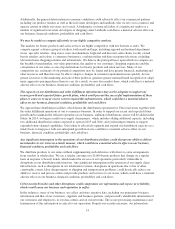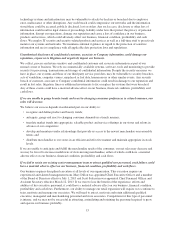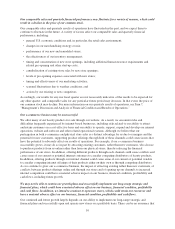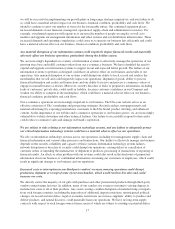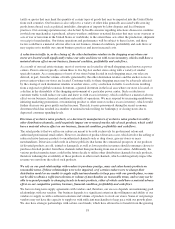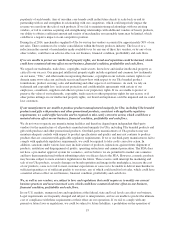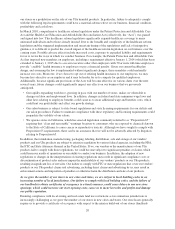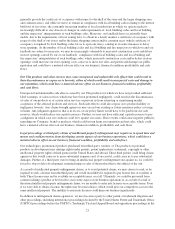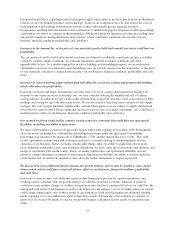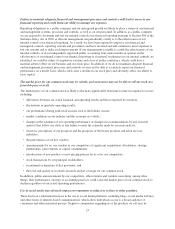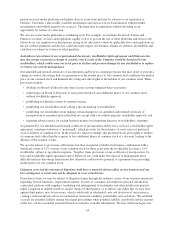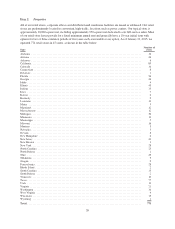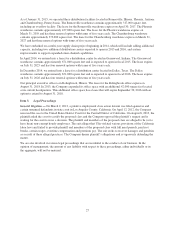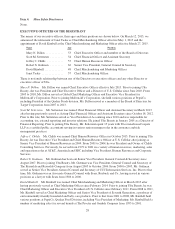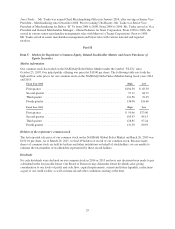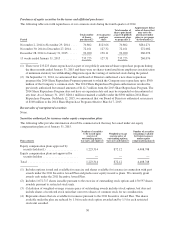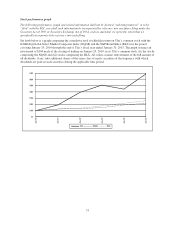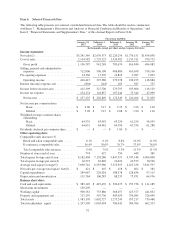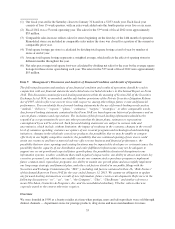Ulta 2014 Annual Report Download - page 28
Download and view the complete annual report
Please find page 28 of the 2014 Ulta annual report below. You can navigate through the pages in the report by either clicking on the pages listed below, or by using the keyword search tool below to find specific information within the annual report.posted on social media platforms and similar devices at any time and may be adverse to our reputation or
business. Customers value readily available information and often act on such information without further
investigation and without regard to its accuracy. The harm may be immediate without affording us an
opportunity for redress or correction.
We also use social media platforms as marketing tools. For example, we maintain Facebook, Twitter and
Pinterest accounts. As laws and regulations rapidly evolve to govern the use of these platforms and devices, the
failure by us, our employees or third parties acting at our direction to abide by applicable laws and regulations in
the use of these platforms and devices could adversely impact our business, financial condition, profitability and
cash flows or subject us to fines or other penalties.
Anti-takeover provisions in our organizational documents, stockholder rights agreement and Delaware law
may discourage or prevent a change in control, even if a sale of the Company would be beneficial to our
stockholders, which could cause our stock price to decline and prevent attempts by our stockholders to replace
or remove our current management.
Our amended and restated certificate of incorporation and by-laws contain provisions that may delay or prevent a
change in control, discourage bids at a premium over the market price of our common stock and harm the market
price of our common stock and diminish the voting and other rights of the holders of our common stock. These
provisions include:
‰dividing our Board of Directors into three classes serving staggered three-year terms;
‰authorizing our Board of Directors to issue preferred stock and additional shares of our common stock
without stockholder approval;
‰prohibiting stockholder actions by written consent;
‰prohibiting our stockholders from calling a special meeting of stockholders;
‰prohibiting our stockholders from making certain changes to our amended and restated certificate of
incorporation or amended and restated bylaws except with a two-thirds majority stockholder approval; and
‰requiring advance notice for raising business matters or nominating directors at stockholders’ meetings.
As permitted by our amended and restated certificate of incorporation and by-laws, we have a stockholder rights
agreement, sometimes known as a “poison pill,” which provides for the issuance of a new series of preferred
stock to holders of common stock. In the event of a takeover attempt, this preferred stock gives rights to holders
of common stock other than the acquirer to buy additional shares of common stock at a discount, leading to the
dilution of the acquirer’s stake.
We are also subject to provisions of Delaware law that, in general, prohibit any business combination with a
beneficial owner of 15% or more of our common stock for three years after the stockholder becomes a 15%
stockholder, subject to specified exceptions. Together, these provisions of our certificate of incorporation, by-
laws and stockholder rights agreement and of Delaware law could make the removal of management more
difficult and may discourage transactions that otherwise could involve payment of a premium over prevailing
market prices for our common stock.
Litigation costs and the outcome of litigation could have a material adverse effect on our business and any
loss contingency accruals may not be adequate to cover actual losses.
From time to time, we may be subject to litigation claims through the ordinary course of our business operations
regarding, but not limited to, employment matters, security of consumer and employee personal information,
contractual relations with suppliers, marketing and infringement of trademarks and other intellectual property
rights. Litigation to defend ourselves against claims by third parties, or to enforce any rights that we may have
against third parties, may be necessary, which could result in substantial costs and diversion of our resources,
causing a material adverse effect on our business, financial condition, profitability and cash flows. We establish
accruals for potential liability arising from legal proceedings when potential liability is probable and the amount
of the loss can be reasonably estimated based on currently available information. We may still incur legal costs
24


